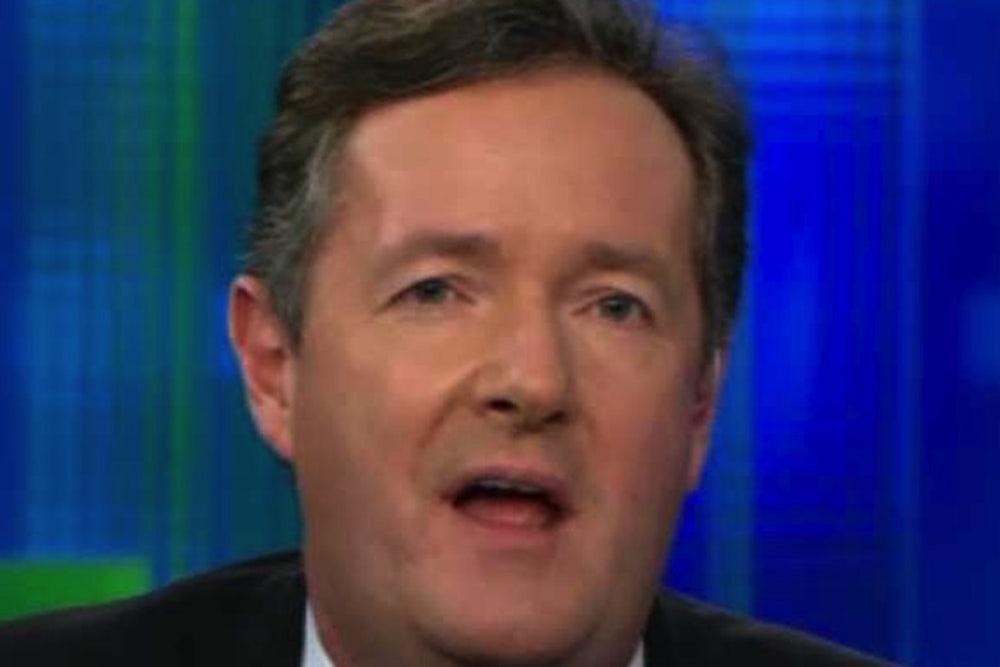Yesterday, CNN announced that it was pulling the plug on “Piers Morgan Live,” which has been floundering in the 9 p.m. slot since it premiered on the heels of Larry King’s departure in 2011. For CNN, the cancellation of Morgan’s show was not a particularly surprising move. Morgan himself was well-aware of the pressures imposed by Jeff Zucker’s vision for the network: “The truth is that if my ratings tank for a sustained period of time, I’m out,” Morgan wrote in his recent memoir Shooting Straight. From the beginning, “Piers Morgan Live” was a pure bid for ratings, designed as the antidote to Larry King’s bland likeability. Yet somehow the show spent nearly its whole time on the air gasping for ratings. It reeled in as few as 50,000 viewers in the 25-to-54 year-old demographic earlier this week for a show featuring Rudy Giuliani and coverage of the violence in Kiev.
Yesterday, David Carr’s column in the Times attributed the failure of the show to Morgan’s Britishness, writing that “the people who tune into a cable news network are, by their nature, deeply interested in America,” and thus unlikely to take kindly to being condescended to by a foreigner. Carr compared Morgan to Simon Cowell, who manages to project a surly gravitas even while judging musical acts, and to David Frost, for whom being foreign was only permissible because he wasn’t a “chronic presence in American living rooms.” Carr even got Morgan on the phone and asked for his own take on his show’s demise: “Look, I am a British guy debating American cultural issues," Morgan said, "including guns, which has been very polarizing, and there is no doubt that there are many in the audience who are tired of me banging on about it.”
But Britishness aside, "Piers Morgan Live” suffered more generally from a misjudgment on CNN’s part of just what it would take for an opinionated newcomer to stake out real estate in the crowded cable news space. In a piece about Morgan’s gun control crusade this past November, I wrote about his “tabloidism as activism”—the way he has applied the same knack for cheap provocation to his anti-gun evangelism as to his splashy Fleet Street coverage of Buckingham Palace. Morgan was a genius of tabloid journalism because he was shameless: in his reporting, but perhaps even more so in his self-promotion, publishing boastful memoirs and name-dropping relentlessly. It’s easy to see why his controversial style looked at first like a potential win for the struggling network. But when he set his journalistic sights on gun control—regardless of the validity of his arguments or the incisiveness of his questioning—his high dudgeon managed to seem like the thinnest veneer for the boosting of his own brand. Maddow and Megyn Kelly regularly trounced Morgan in the ratings because, for one, being on MSNBC or Fox meant that they could assume their audiences agreed with the angle of their analysis; they didn’t need to scramble to assert their point of view by hammering the exact same arguments night after night. CNN’s identity crisis had never looked quite so stark as it did on “Piers Morgan Live.”
In his interview with Carr, Morgan came across as well as he ever has. He seemed self-aware and confident without being smug. “There are all kinds of people who can do news [at CNN],” he said. “I’d like to do work—interviews with big celebrities and powerful people—that is better suited to what I do well and fit with what Jeff is trying to do with the network.” And he’s right, of course: he is far better suited to interviews with big celebrities than to holding down the anchor desk during a breaking news event. He is a genuinely skillful celebrity interviewer, most engaging while grilling Oprah about her love life or Clooney about his anger over accusations that his activism in Sudan is phony. He doesn’t belong in the 9 p.m. slot. But if CNN could find some way to capitalize on his shamelessness in a way that doesn’t cheapen sensitive political and cultural issues along the way, it might have a hit on its hands at last.
